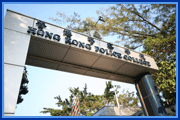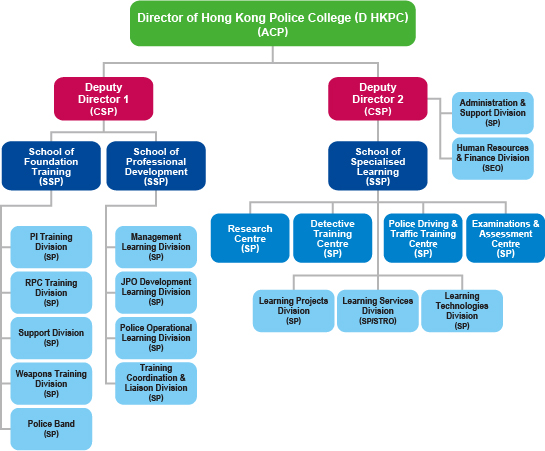Introduction



The Police College was established in January 2006, replacing what was previously known as Training Wing, to develop police training in a strategic manner and establish itself as a centre of excellence in police training.
An Assistant Commissioner of Police, with the title of Director of Hong Kong Police College (D HKPC), commands the Police College assisted by two Deputy Directors in the rank of Chief Superintendent of Police. D HKPC is responsible to the Director of Personnel and Training, a Senior Assistant Commissioner of Police, for the implementation of Force training and development policy.
To enhance the efficiency of the College as well as to provide a foundation that can be expanded to cope with the present and future levels of training demand, the College has been reformed and restructured on a three-school basis supplemented by two independently-operated divisions since April 2015. Two Schools, namely School of Foundation Training and School of Professional Development are commanded by School Heads in the rank of Senior Superintendent of Police and come under one Deputy Director. The other School, namely School of Specialised Learning and two Divisions at the College Headquarters come under the other Deputy Director. School of Specialised Learning is commanded by a School Head in the rank of a Senior Superintendent of Police, who in turn supervises Research Centre (RC), Detective Training Centre (DTC), Examinations and Assessment Centre (EAC), Police Driving and Traffic Training Centre (PD&TTC), Learning Projects Division (LPD), Learning Services Division (LSD) and Learning Technologies Division (LTD), each headed by a Superintendent of Police. As regards the two Divisions, Administration and Support Division (A&SD) is headed by a Superintendent of Police and Human Resources and Finance Division (HR&FD) by a Senior Executive Officer. Both Divisions are to provide different management support services to the College.
The College believes that officers should take responsibility for their own learning and has therefore adopted the following Learning Trio as its overall approach to police education, which requires:
- formal training delivered by the College;
- workplace learning on the job; and
- self-study by officers in their own time.
In delivering formal training for different ranks to meet their varying training and development needs, the College has adopted a three-tiered training hierarchy consisting of vocational development, professional development and executive development.
The College organises and delivers various training programmes ranging from foundation training for recruits to a wide range of specialised and generic competency training, such as detective training, use of force training, driving training and leadership training, for serving officers. It also organises Force-wide training projects in specialised subjects including Occupational Safety and Health Training, Psychological Competency Training, etc.
To achieve its ambition of becoming a leading centre of excellence in police training and development, the College has implemented the Quality Assurance Mechanism, which mandates that College training divisions comply with a number of quality assurance requirements. The College continues to strengthen its professional relationship with its external training partners, including local tertiary and overseas police training institutions. Commencing January 2020, the College has reached a new height in the Vocational and Professional Education and Training (VPET) sector by becoming the first non-tertiary education institution and government department with Programme Area Accreditation (PAA) Status. With this status, the Police College has the ability to operate Qualifications Framework recognised learning programmes in the Programme Area of ‘Law Enforcement and Security Studies’ up to Level 5.
To continuously promote knowledge sharing and lifelong learning, the College has implemented various Knowledge Management (KM) initiatives according to the Force 5-year KM Strategy Plan and, with the aid of technology, helped build the Force as a ‘Knowledge-based Organisation’.
Ambition and Purpose
Ambition
To become a leading centre of excellence in police training and development in the international arena
Purpose
We train and develop officers into police professionals with necessary attitude, skills and knowledge to serve Hong Kong with Honour, Duty and Loyalty.
Philosophy
- We keep improving beyond our areas of excellence
- We encourage openness and innovative ideas
- We value local and worldwide collaboration
- We emphasise professional leadership at all levels
- We champion experience and knowledge sharing
Strategy
- Train and develop officers to maintain and enhance the organisational competence of the Force
- Build strategic partnership both within and outside the Force to strengthen its organisational capacity
- Leverage technology to expand training opportunities and optimise learning outcome
- Embed knowledge management as part of the Force culture
- Develop organisational learning capability of the Force to embrace the future
Strategic Priorities
Supporting Force Strategic Directions
Fulfilling the Force’s vision of ensuring the safety and stability of Hong Kong
Enhancing Performance
Officers’ performance enhanced through quality training and development
Raising Quality of Training
Quality of training assured through improved mechanism, facilities and quality training staff
Leveraging Technology
Learning outcome optimised and training opportunity expanded
Organisation Structure
